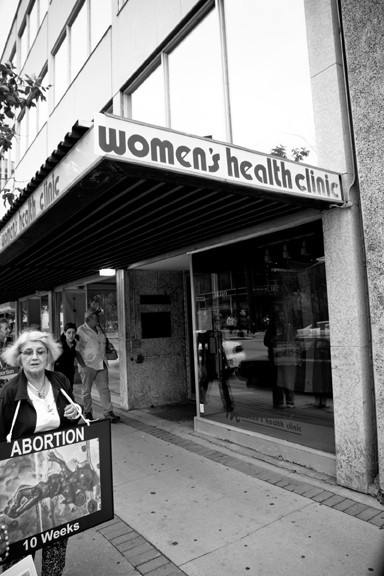Taking the abortion debate to the street
Local group takes on abortion every Thursday
The front sidewalk of the Women’s Health Clinic (WHC), a feminist community-based health centre located at 419 Graham Avenue, has become a forum for a longstanding Canadian debate.
Members of the Campaign Life Coalition (CLC), a multi-denominational pro-life group, protest every Thursday in front of the clinic.
“Our approach is that women themselves are the best people to make decisions on their own health,” said Joan Dawkins, executive director of the WHC. “And they need to be in an environment that is conducive to choice.”
The WHC is both a centre to provide counselling on unplanned pregnancy options, as well as a place where women can find a capable midwife and register for new mothers’ programs.
“Ultimately, we believe in choice across a wide spectrum,” said Dawkins.
Although the clinic is ardently pro-choice, abortions are performed at undisclosed locations in Winnipeg. This fact prompts the Campaign Life Coalition to protest at locations aligned with a pro-choice ideology.
“They keep the abortion clinic a secret,” said Maria Slykerman, the president of the CLC’s Manitoba chapter. “It’s pretty darn sneaky…abortion is paid for out of tax payer’s money, they’re killing babies with our money.”
The CLC is a national organization with several provincial chapters, each working to bring Canada’s attention to the abortion issue. The CLC approaches this goal from various angles, from the endorsement of specific federal politicians to small pickets and larger demonstrations. The CLC conducted their last large protest in front of the Women’s Hospital, as part of their 40 Days for Life campaign earlier this year.
“We fast, pray and do outreach for 40 days, from 8 a.m. to 8 p.m., to change abortion policies in Canada,” said Slykerman. “We don’t always know how far reaching it is; only God knows… hopefully it will prompt women to decide to keep their children.”
The CLC believes that small protests, like the ones regularly held at the Women’s Health Clinic, can be just as effective as the larger demonstrations, even if the change is not immediately evident.
“We get a lot of reaction out of people, but we don’t always see the result… you can kill babies all you want, but the doctors are not God and they don’t necessarily know what will happen,” said Florence Bouchard, a protester and member of the CLC, who opposes counselling older women to abort because of possible complications.
Among the pamphlets and publications handed out during their weekly picket, the CLC refers women to the pro-life Crisis Pregnancy Centre, located at 650 Broadway.
The Crisis Centre practices a profoundly different approach to the counselling of pregnant women.
While the WHC will counsel women in unplanned pregnancy options, including abortion, the Crisis Centre is committed in part to helping women who suffer from post-abortion trauma or depression, according to their website. The Centre was unavailable for comment before press time.
“We can live in the world together but we cannot stand on any mutual ground,” said WHC’s Dawkins. “I think these are very black and white issues.”
“I don’t think so,” said CLC’s Slykerman, when asked whether pro-choice and pro-life people can coexist.
“One believes in evil and one believes in good…you can’t kill innocent human beings and see eye to eye. It’s impossible.”
Published in Volume 64, Number 1 of The Uniter (September 3, 2009)







